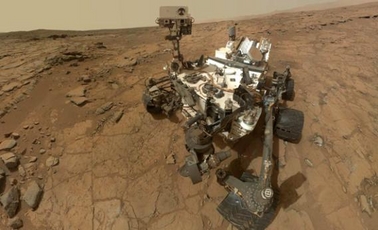Sep 23 2013
Robots are the pioneering space explorers of the future, argues Srikanth Saripalli, an assistant professor at ASU’s School of Earth and Space Exploration, in a Future Tense article for Slate magazine.
 Self-organizing swarms of tiny robots will replace large rovers like Curiosity in the future, argues ASU's Srikanth Saripalli. Photo by: NASA/JPL-Caltech/MSSS
Self-organizing swarms of tiny robots will replace large rovers like Curiosity in the future, argues ASU's Srikanth Saripalli. Photo by: NASA/JPL-Caltech/MSSS
Responding to a space exploration roadmap recently released by NASA and the International Space Exploration Coordination Group that calls for robotic and human missions to near-Earth asteroids, the Moon and Mars, Saripalli argues that most of the arguments in favor of manned space exploration are based on near-sighted assumptions about emerging developments in robotics.
Saripalli posits that in the next 100 years or so, human bodies will merge with robotic technologies, leading to advancements in human durability and survivability, even in harsh environments on other planets. You read that right: cyborg space exploration. The astronauts of the future will probably look more like Robocop than Buzz Aldrin.
While the Curiosity rover on Mars has been successful, Saripalli points out that the robots that we have sent into space so far “are not at all ‘autonomous’ or ‘intelligent’ in any sense” and require precise instructions from Earth for every movement, no matter how simple.
The robots we will use to explore space in the future will not look like the Curiosity rover or "Star Wars" iconic C-3PO or R2-D2. Instead, “we will transition from large, heavy robots and satellites to ‘nanosats’ and small, networked robots” that can be deployed cheaply by the thousands. These tiny bots will “form a self-organizing network that can quickly explore areas of interest and also organize themselves into larger machines that can mine metals or develop new vehicles for future exploration.”